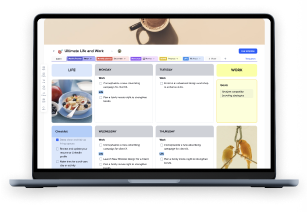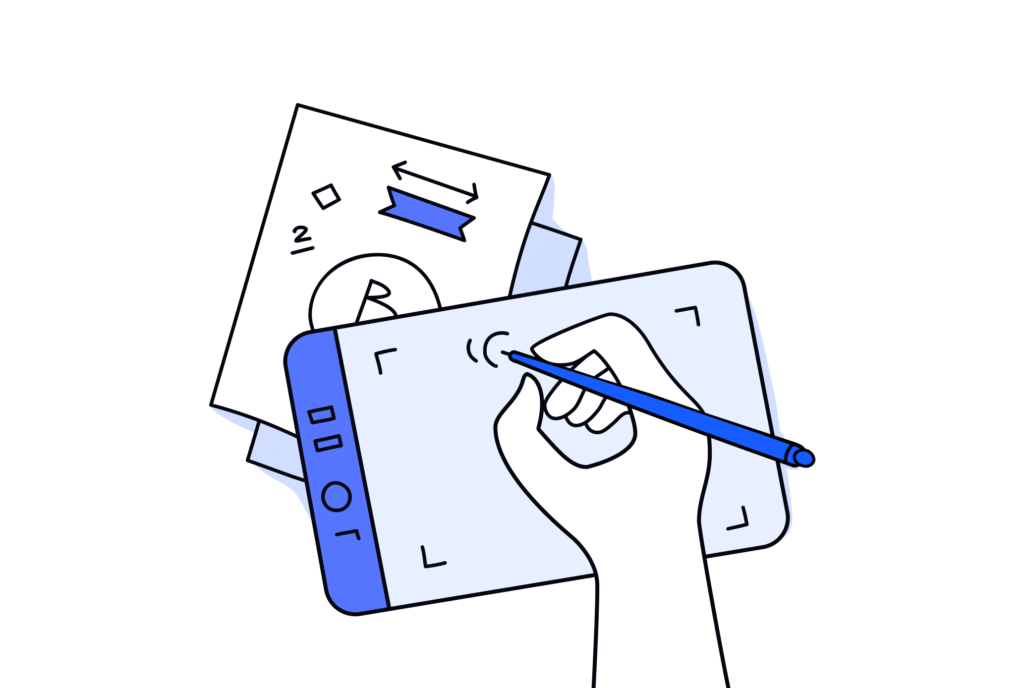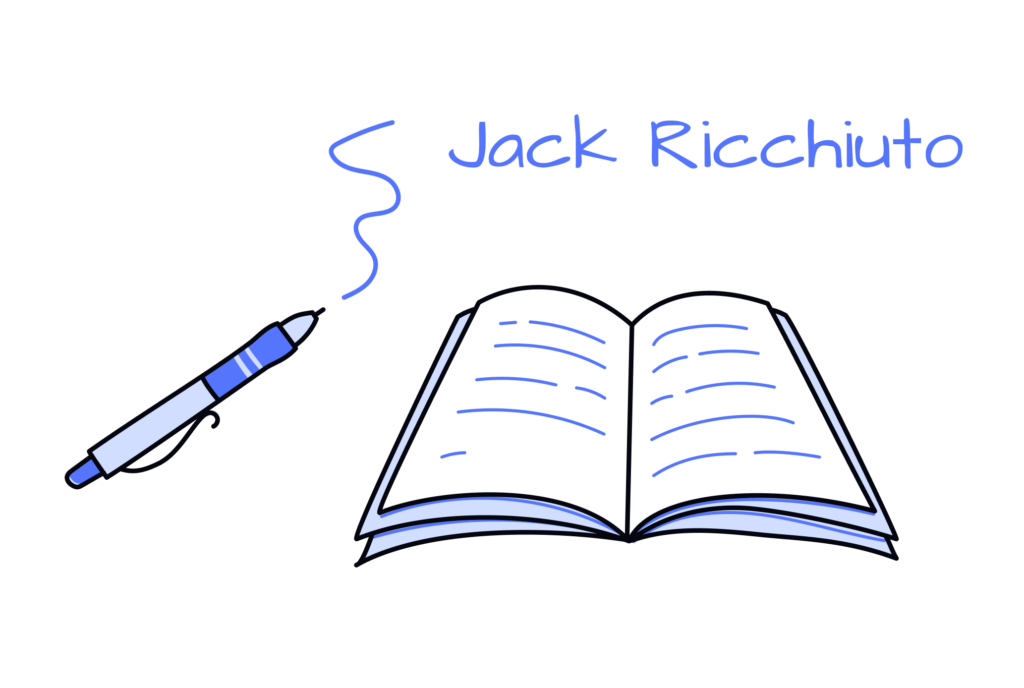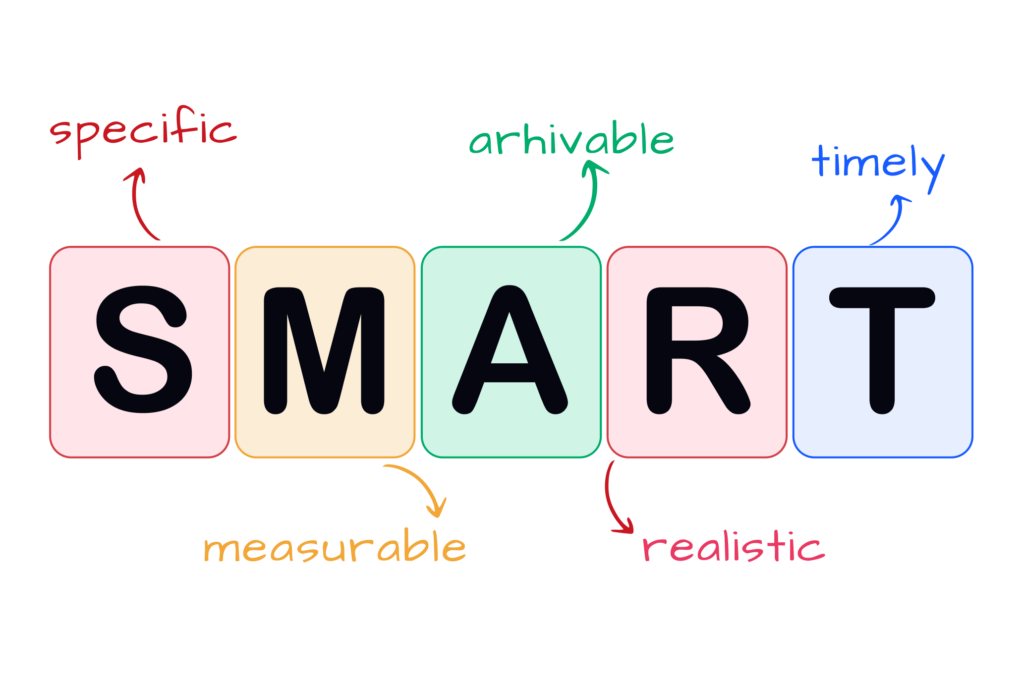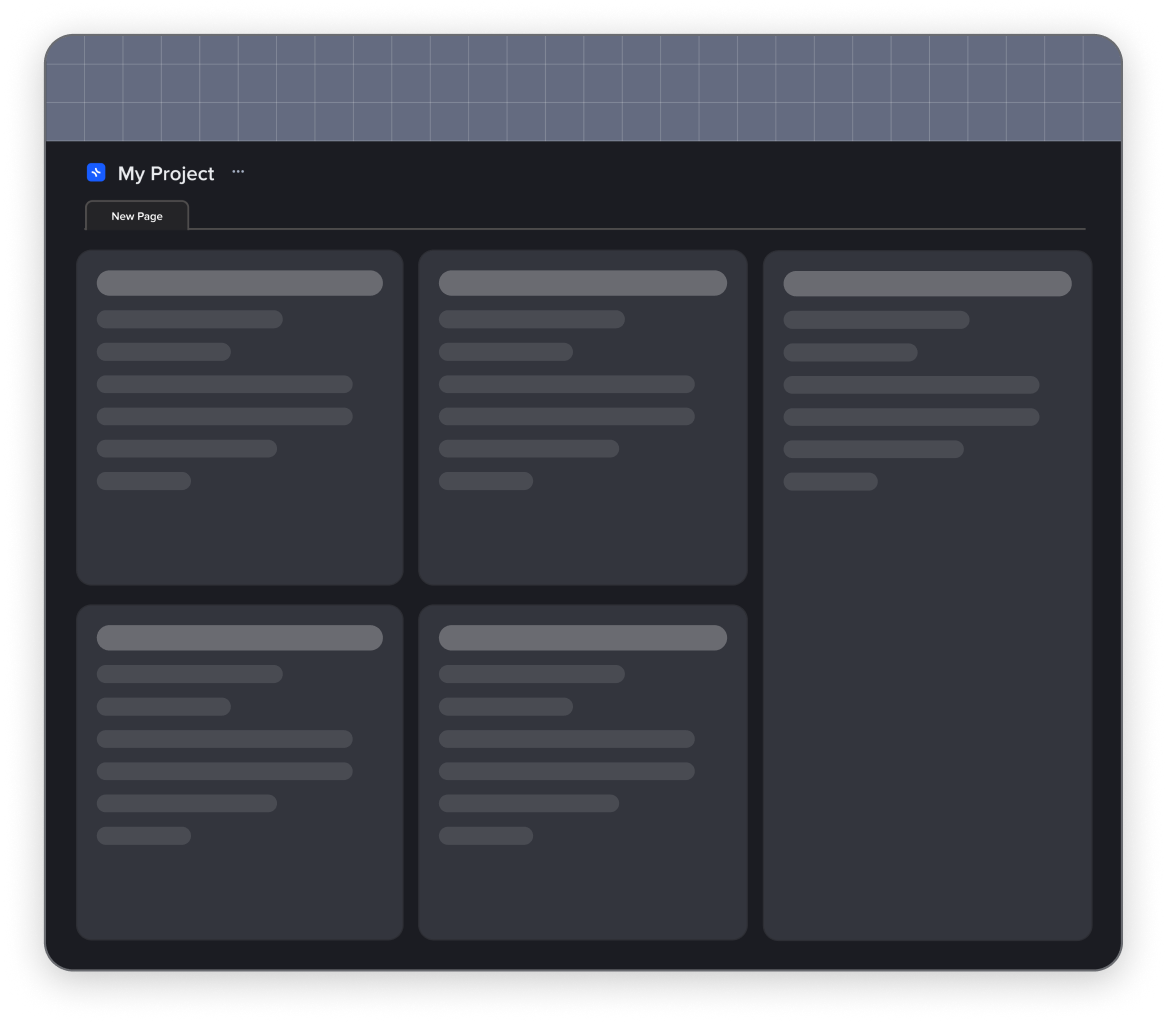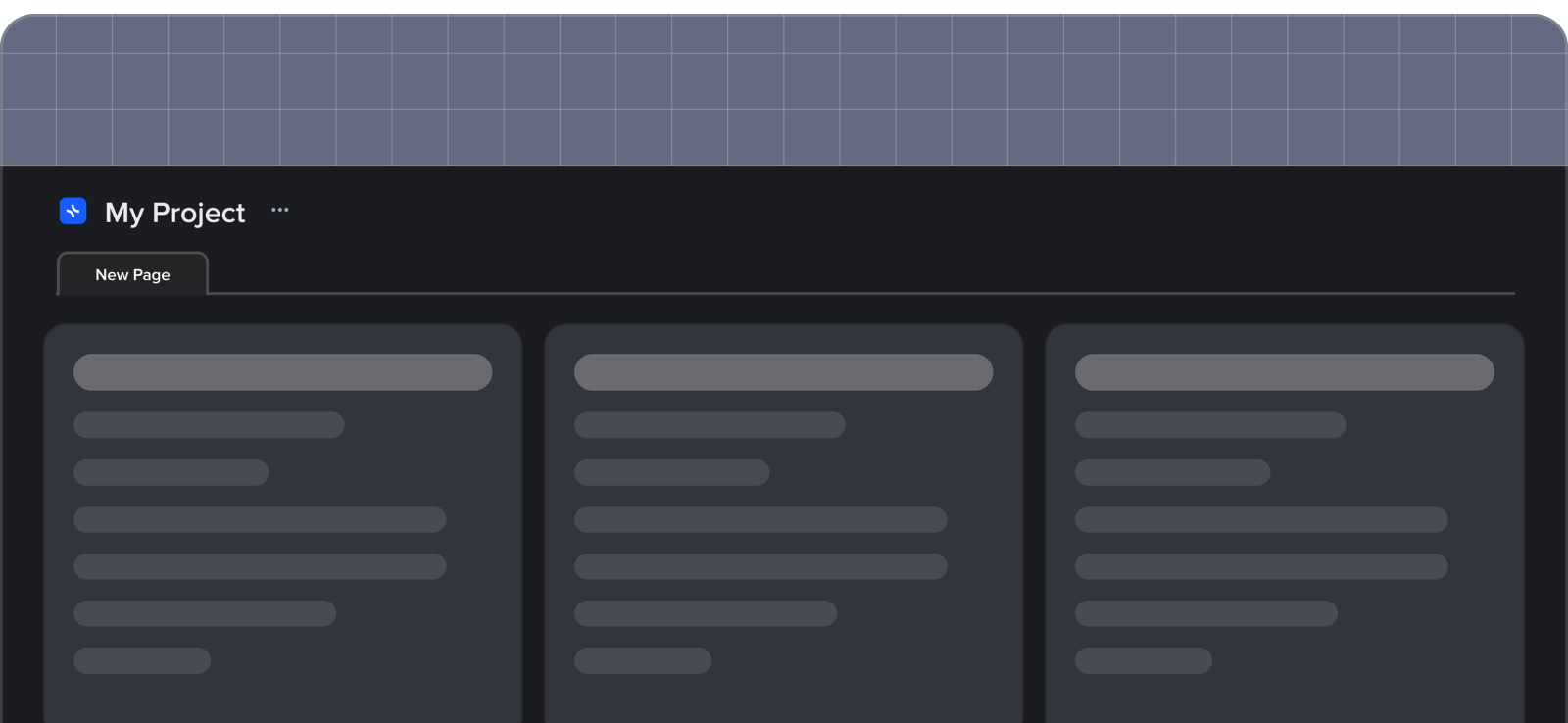How to be more productive? How can one manage all the tasks without being a machine? How can one overcome procrastination once and for all?
In a nutshell, consistency, hard work, self-management skills, and the ability to listen to yourself and your needs are the keys. But the question is so tremendously complicated and important that there will also be many important points to keep in mind, many approaches, and even more unique tricks and tips to know to become more productive.
When we see highly productive people, it may seem they were born this way. However, someone’s productivity usually results from experience and knowledge. They know how to be more productive using their resources and adjusting to current situations and circumstances.
Today, I want to share how to boost your productivity using xTiles. The service was created to help you manage and organize your time beneficially and easily, so it will be the perfect tool to grow new habits, become the best version of yourself, and get the maximum profit from one day.

Tips to be more productive
You may apply thousands of possible tricks and tips to become more productive in life. However, most of them are about personal growth and development. Using them from time to time won’t bring you much result. Y
ou need to make them a part of your routine, a part of how you think and see the world, to get the benefit from them. Consistency is what makes a tip work.
That’s why many people who try something once or twice end up quitting and losing motivation. They don’t believe in productivity and motivation because it didn’t work for them. However, it’s like muscle growth – you need to work hard to gain something, and you need to work even harder to keep it.
Habits define a lot in our lives. Unfortunately, bad habits have much more effect on how we spend our time than positive ones.
That’s why giving up on destructive ones is half the battle. Even without learning something new, you will see how incredibly productive you become. However, if you’re determined to become superhuman and manage all the tasks in the world successfully and quickly, you will need to learn a couple of tips.
1. First things first
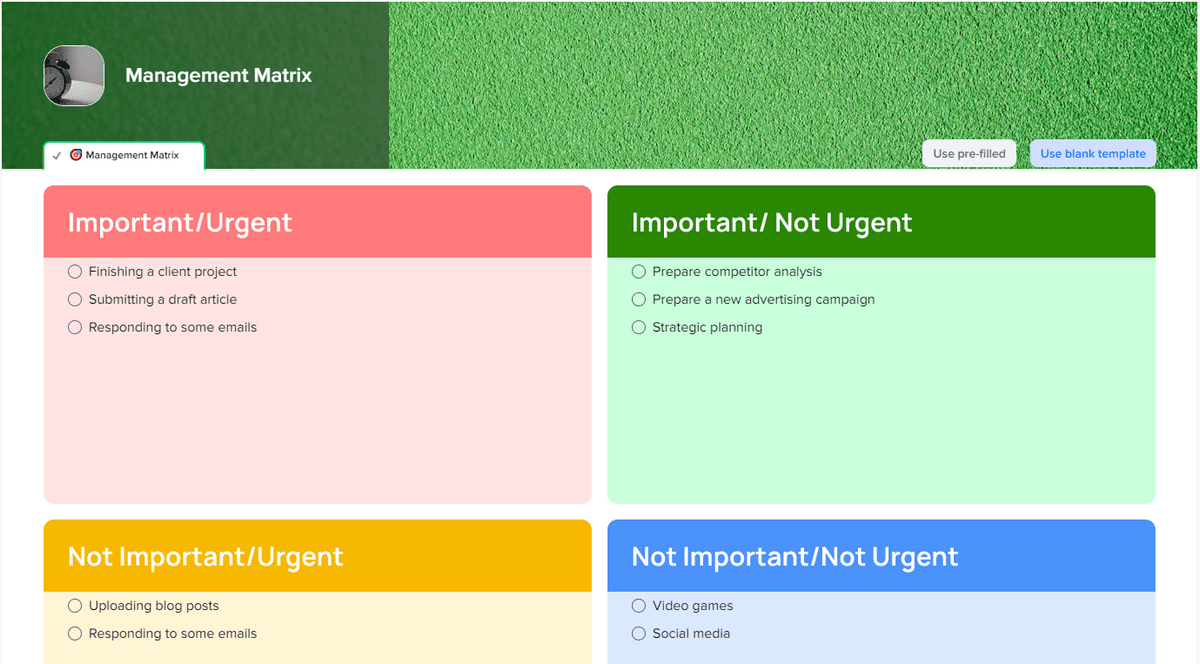
People tend to postpone doing things if they are boring, time-consuming, require much effort, or are unpleasant. Usually, those tasks are the most important ones. Procrastination is a part of us, and it’s hard to hide or overcome it. We will try to avoid what we don’t want to do at any cost, just to preserve our resources.
The approach I would like to suggest is called Most Important Tasks (MIT). Before you buckle up for doing any kind of stuff, go through your to-do list and check what must be finished by the end of the day. At first, it might be challenging, and everything might seem super important.
However, prioritizing tasks is crucial for completing them correctly and on time. Here are a few things you may try to learn to divide important tasks from those that can wait.
- You may try the xTiles Time Management Matrix Template (also known as Eisenhower Matrix) to define which of your tasks are the most important today.
When you polish this habit, your ability to create a workable to-do list will develop too. Many a time, the main mistake is putting everything on a list, hoping you will have enough time to finish it. Such an approach is the shortest way to burnout, and your tasks will likely stay unfinished. You may also use the xTiles To-Do List Template to minimize the time you spend creating your list of to-dos.
- Use the 80/20 principle. You may also know it as a Pareto Principle. It states that 80% of your success comes from 20% of your effort. So, you need to find that 20% on your to-do list and get them done as quickly as you can and as well as you can.
2. Don’t be afraid to delegate your tasks
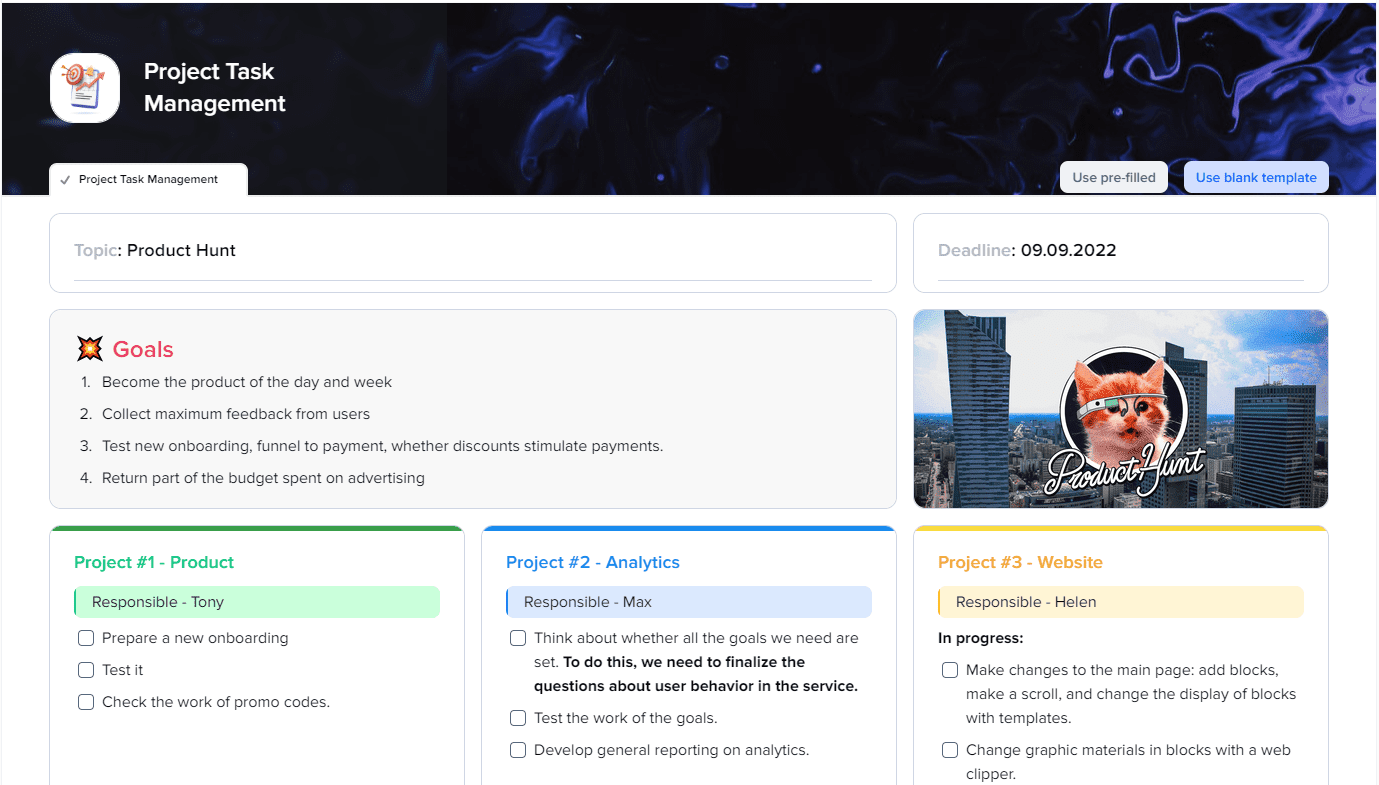
You can’t save the planet on your own, just as you can’t handle all your team’s tasks alone. Running all you life to complete all your tasks at time is an approach that leads to quick burnout.
Usually, people try to do everything independently because they lack trust. We might think there’s no point in asking someone to do something because they will do it badly, and we will still need to fix that afterward.
Well, you will never know how well a person may handle a task if you don’t give them a chance.
This is like being a parent. You need to trust your kids to let them grow responsible and capable, even though at first you need to keep an eye on them without showing it. Afterward, you will know that you can rely on them in moments of need.
Trying to keep control over everything, you might forget how to relax. All-consuming anxiety that something will go wrong if you, at least, don’t participate is another sure way to quick burnout. Let people try. Who knows, maybe they have a lot to amuse you.
Delegating your tasks to your teammates also helps you build trust within the team. You encourage them to develop new skills and gain new knowledge. But the best part is that you aren’t overwhelmed with work now.
The final argument for relaxing and delegating some of your responsibilities and tasks to others is that the MIT approach might not work as it should if you keep trying to manage everything independently.
Yes, you can ruin all the results yourself by not being able to relax a bit.
You may use the xTiles with your colleagues. For example, the xTiles Project Management Template will help you coordinate your team’s work.
3. Develop the skill of intense focus
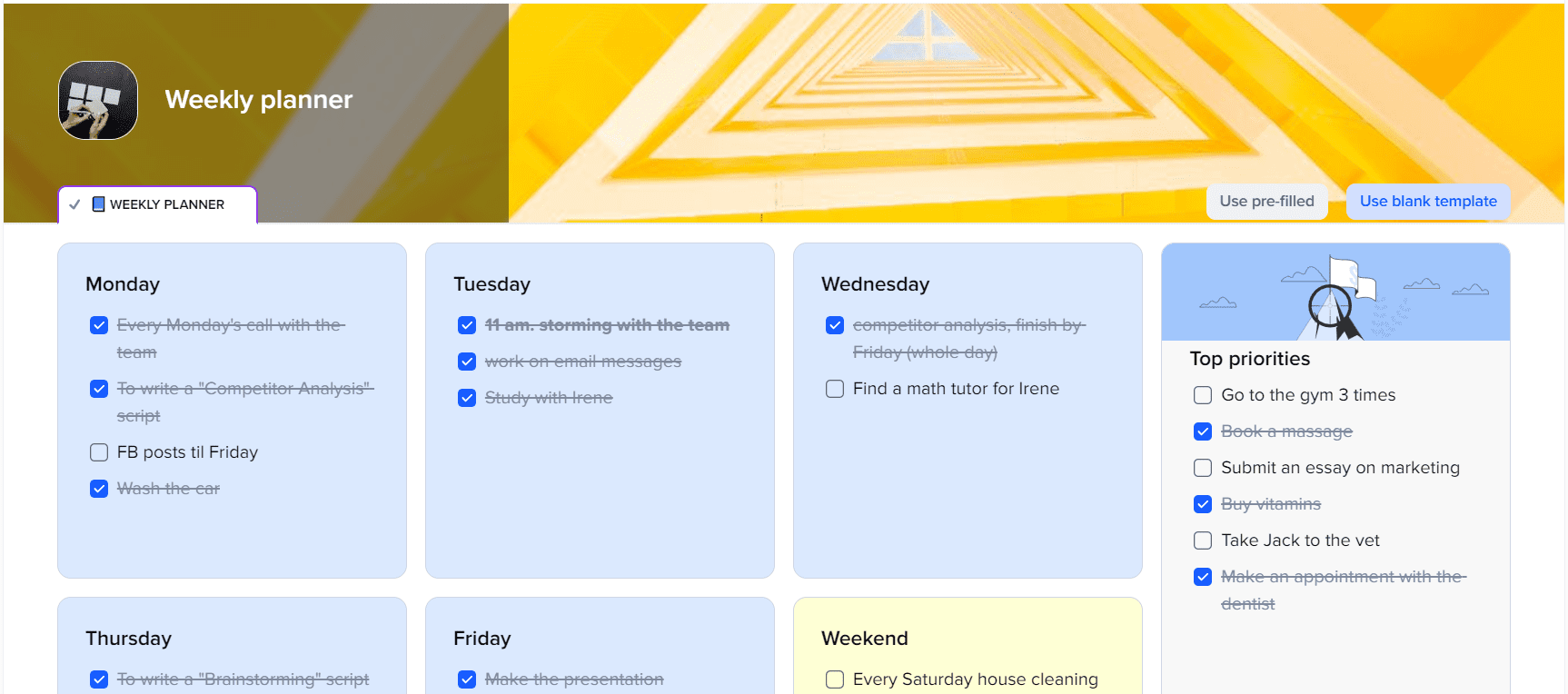
It’s much easier to divide big tasks into smaller ones. However, sometimes it’s just impossible. You need to devote all of your energy, knowledge, and time to finishing one big task. Usually, they are called “deep work,” and focusing on marking this task as done might be challenging.
Short videos from TikTok and Instagram play a bad trick on us. Our ability to stay concentrated for a long time is limited. How can one fix that to become more productive? There are a couple of ways to get yourself focused on one task for the needed time.
- Schedule your deep work. Let it be in your planner, so you can’t find excuses to postpone it. You may try the xTiles Weekly Planner Template to divide your deep work sessions evenly throughout your week.
- Be ready that you might get bored while working on your task. That’s normal. You don’t need quick dopamine from social media because it most likely will distract you from what has to be done.
- Better try the 20-20-20 rule – every twenty minutes, give yourself a break from using a screen, and focus your eyes on something twenty feet away from you for twenty seconds. Surely, it might sound boring too, but, after all, it’s your time for deep work.
- The entertainment will be later, and it will be pretty rewarding if you now devote all of your energy to getting that assignment done.
- Mute your notifications. That meme or video your friend is sending you can wait till later. When you don’t want to do something, and tasks that require deep focusing are usually one of these, even working email might become interesting. You may ask people directly to give you some time for intense work and try to resolve their issues independently or at least wait until you’re free.
- Create an environment where you can be the most productive. What do you need to be more productive? Work from your sofa wearing pajamas? Sitting in the middle of a busy office? Go ahead. If you need music to keep yourself occupied, then let it play.
- Get yourself a distraction list. If you’re a novice to intense focusing, you still might struggle with keeping your mind occupied with one task at a time. The human brain quickly jumps from one idea to another, and that’s okay.
- Some of these ideas and thoughts might be total gibberish with no apparent purpose. However, some might be pretty potent, so letting them disappear is a waste. How could you save them without affecting your productivity? Get a list to jot them down for later consideration. You may try Quick Notes in your xTiles app. Everything you write there will appear in your workspace.
4. Develop the skill of breaking your tasks into smaller ones
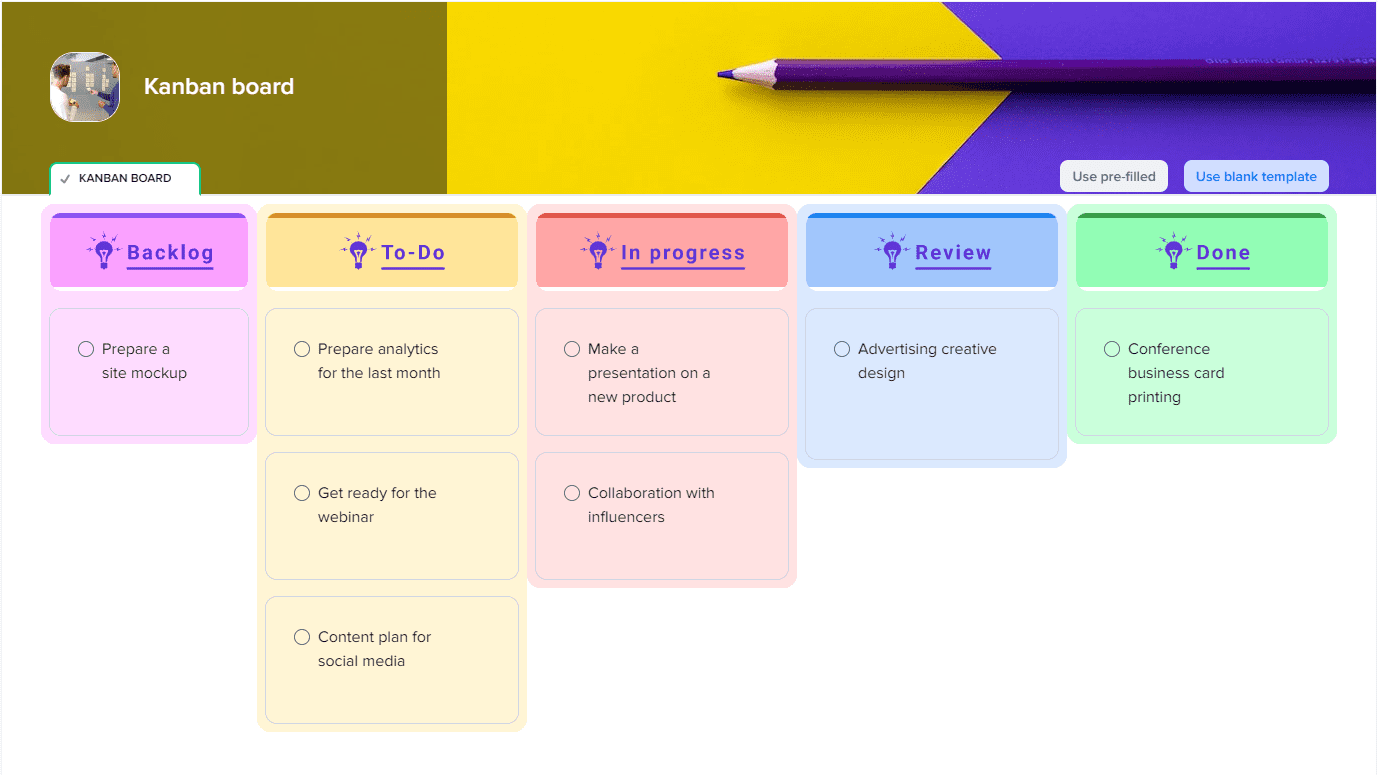
You already know what deep work is. Now let’s check how to turn your big tasks into smaller ones and get them done one at a time. Ticking many tasks on your do-to list is way more rewarding than having one big task stay untouched for days. That’s why this habit is also about motivating and challenging yourself.
We already mentioned that it’s not always possible to do. So, if you’ve been looking at your to-do list for 15 minutes straight and haven’t got any idea of how to turn that one scary big task into a couple of smaller tasks, then there might be a chance you don’t have this option.
Consider how many processes must be accomplished to say your task is done. For example, you’re writing an essay. What do you need to do? Come up with a topic, research your topic, do an outline, write the text, go over it to make sure everything is correct, show it to your academic advisor, and maybe present it and discuss it with your colleagues.
See how many hidden tasks there are behind simple “to write an essay”? You may try to use the xTiles Kanban Board Template to break down your big tasks into smaller, easier ones.
Another great approach is to divide your day into specific blocks. Dedicating each block to a specific type of task can help you maintain tight focus and more easily switch between different goals.
5. Maintain a healthy work-life balance
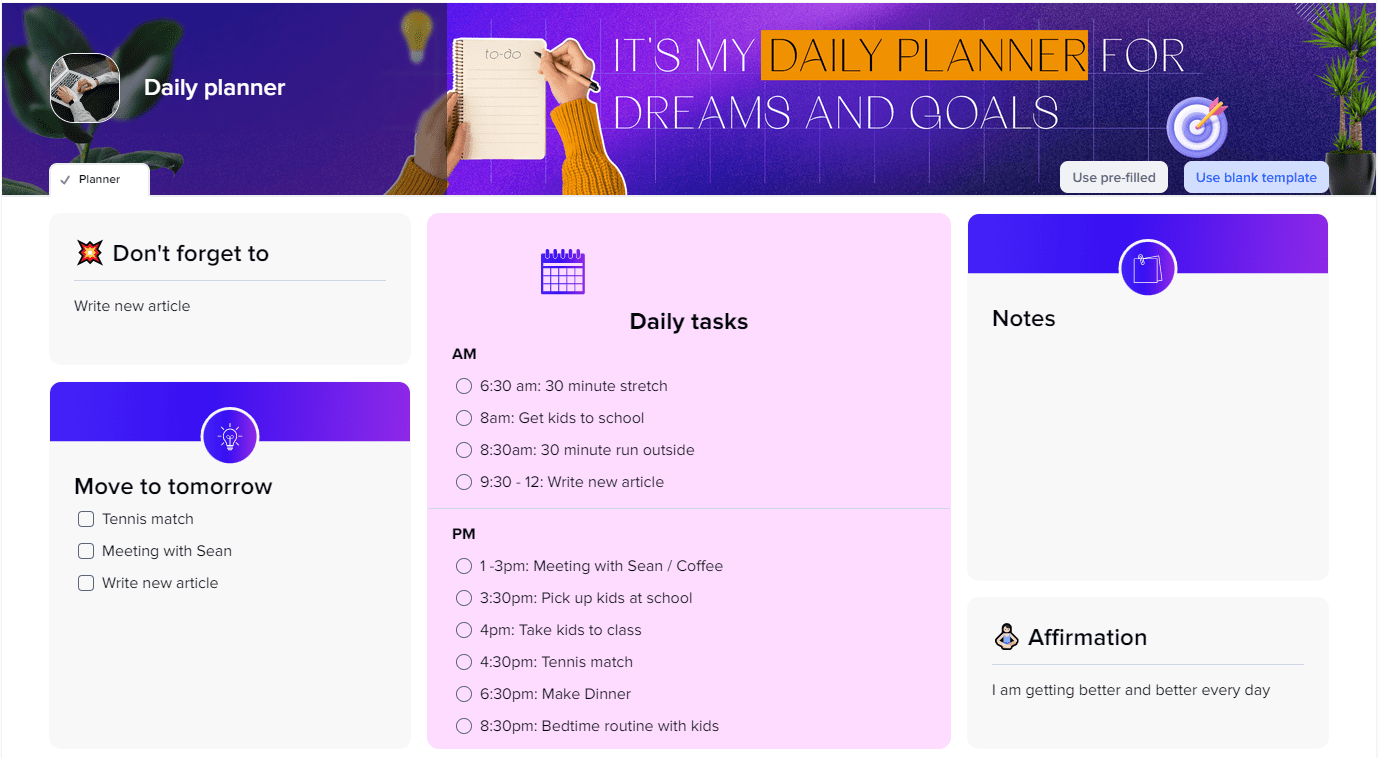
Everything has two sides, and productivity is no different. Trying to finish all of your and someone else’s tasks is not about being productive. It’s about leading yourself straight to burnout and stress. Sometimes even mental breakdown. The balance is the key.
Our social media is full of people who work two jobs, go to the gym, spend time with friends, constantly learn something new, etc. No wonder many of us believe it’s normal to be everywhere simultaneously. However, you never know how much of that content was made yesterday, last week, or even last month. Maybe that super-productive person has spent their day in bed while uploading all these photos and videos.
You need to remember that you’re the boss. Your habits don’t rule you, and toxic productivity isn’t a coping mechanism to overcome your personal problems. Take breaks if you feel overwhelmed. If you feel like doing nothing today, then go with that feeling. Our lives don’t have to be a crazy pursuit of blurred dreams and goals.
Having a weekly planner where you schedule your free time together with your work tasks will help you maintain a healthy work-life balance. Many people plan only their work because they think it’s the only purpose of a planner.
I was just like that as well. At the end of the day, they have no window for rest, leaving their personal needs unsatisfied. And many people are trying to learn how to be more productive at work, forgetting about other spheres of their lives.
You may try the xTiles Weekly Planner Template or the xTiles Daily Planner Template to put enjoyable stuff among your not-that-enjoyable work routine.
If you’ve been wondering how to become more productive working from home, your work-life balance is probably damaged. The main disadvantage of remote work is that the boundaries between work and life become blurred.
If possible, create a working space or get a separate room to become your personal office and work only there. And when you’re leaving that space, you’re leaving your work there. Don’t bring it with you to your bedroom or living room.
6. Don’t waste your time on minor decisions
How much time do you spend each morning choosing what to wear today? How much time do you need to decide what to have for lunch? How much time does it take to choose a film for an evening?
Sometimes, we waste our time and energy on things that aren’t important at all. That habit is about prioritizing too. You will need to learn to outsource those decisions that only steal your time and have no effect on the general result and those you need to consider carefully.
How do you find out what can be skipped without any consequences? Track your daily routine and try to skip one at a time. Does it affect you in any way? No? Then maybe you didn’t need it in the first place. You may check every ritual you do during the day using the xTiles Time Management Matrix Template. However, I don’t recommend getting rid of all of them at the same time. If something brings you joy, let it be.
The situation is more complicated with occasional decisions. You will need to use all of your analyzing and improvising skills first. Then, after some time, your intuition will do the job.
7. Inspiration and motivation come from work
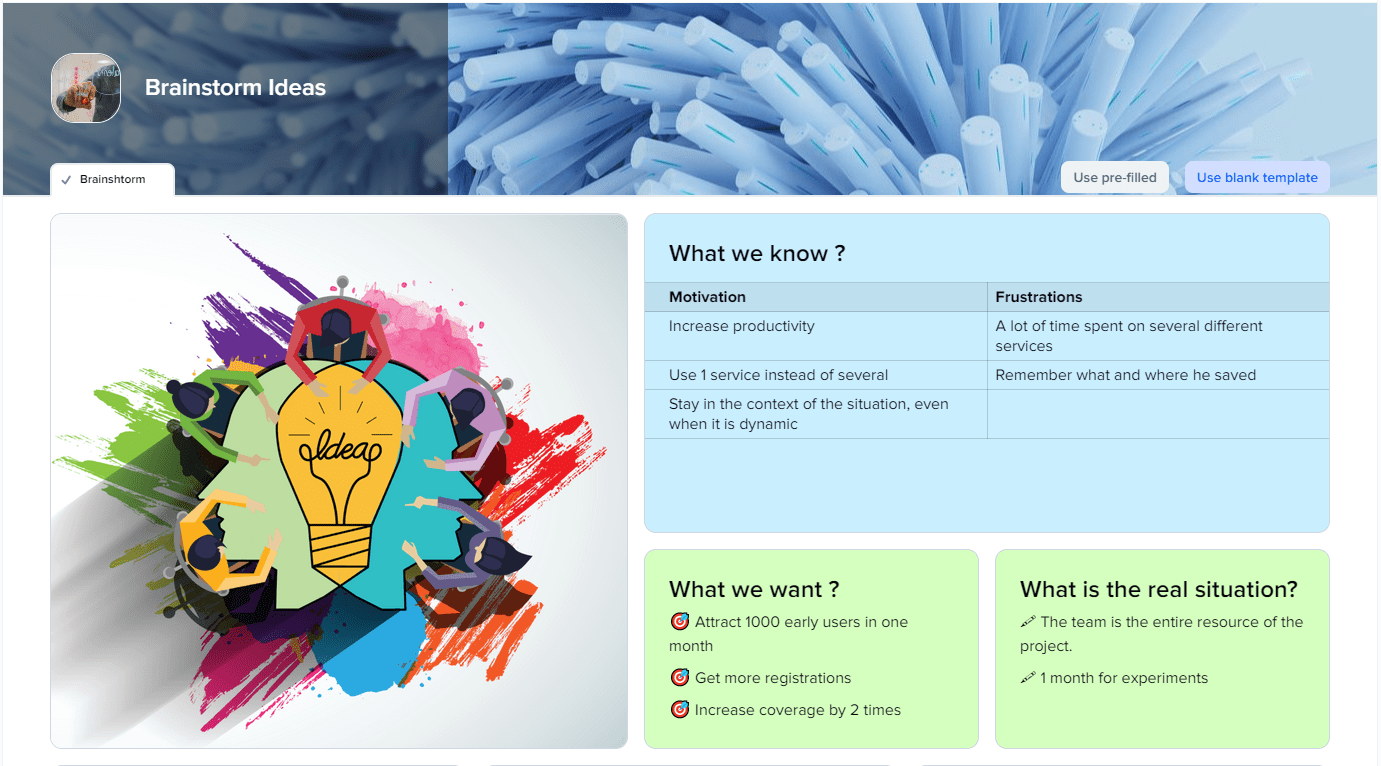
The misconception that inspiration is the first step in any job getting done leads to people waiting until all deadlines are burning. You need to start to get motivated or inspired. T
hese two don’t arise on their own. You need to boost them by buckling down and working. The energy you need to accomplish something comes from activity, not procrastination.
You may try other ways if you struggle with motivation after you’ve started. Brainstorming sessions will help you analyze what you currently have and look for possible solutions.
You may try the xTiles Brainstorming Template to come up with new ideas. If there’s still no motivation, maybe you need to learn more about the project you’re working on. Creating a mood board will help you realize what you’re doing and why this is important for you. Additionally, visual elements and their combinations may stimulate your inspiration.
Summing up: my own experience
Finding ways to be more productive in life might be challenging because we’re all different. What will work for one person might be totally useless for another. We all have different jobs, and we all have different natural inclinations, so there’s no one-fits-all way.
The tips from this article are what helped me become more productive. The combination was good and fortunate at the same time because I could see the first results after a week or two. My manager noticed the changes too.
I started with a simple Weekly Planner by xTiles. I divided my time evenly between tasks, prioritizing what needed to be done now. It also helped me relax and delegate some less important tasks to others, getting myself extra time for the main projects.
I believe that my journey to boost my productivity isn’t finished yet. There’s so much to learn and gain. I’m sure that new approaches and tips will be invented in the near future. Maybe I will return to you with new tips soon.
FAQ
1. How can I overcome procrastination and become more productive?
Consistency, hard work, self-management skills, and the ability to listen to yourself and your needs are key to overcoming procrastination. Using tools like the xTiles Time Management Matrix and To-Do List templates can help you prioritize tasks and stay focused.
2. How can I learn to delegate tasks and not try to do everything myself?
Delegating tasks to your team helps build trust and allows you to focus on your Most Important Tasks (MITs). Using collaborative tools like the xTiles Project Management template can make it easier to coordinate work with your team.
3. How can I develop the skill of intense focus and avoid distractions?
Schedule your deep work sessions, use the 20-20-20 rule to take breaks, mute notifications, and create a distraction-free environment. The xTiles Weekly Planner can help you allocate dedicated time for focused work.
4. How can I maintain a healthy work-life balance while being productive?
Remember that your habits don’t rule you, and toxic productivity isn’t a coping mechanism. Take breaks when you feel overwhelmed, and use the xTiles Weekly or Daily Planner to schedule both work tasks and personal time.




